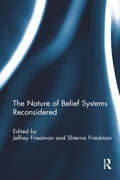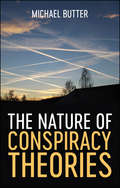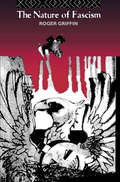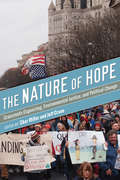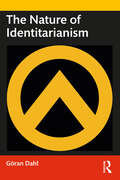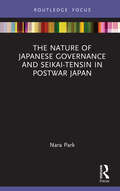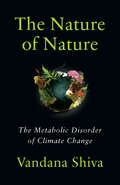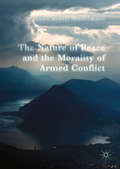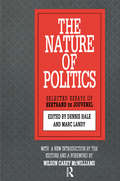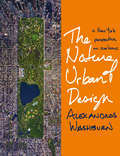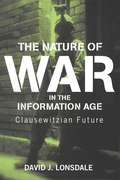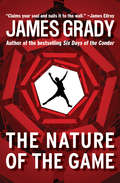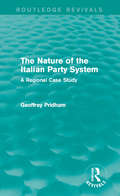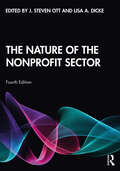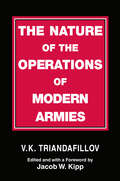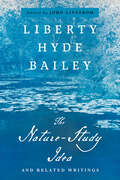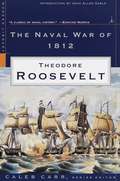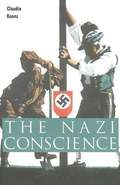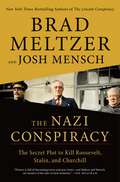- Table View
- List View
The Nature of Belief Systems Reconsidered
by Jeffrey Friedman and Shterna FriedmanIn the foundational document of modern public-opinion research, Philip E. Converse’s "The Nature of Belief Systems in Mass Publics" (1964) established the U.S. public’s startling political ignorance. This volume makes Converse’s long out-of-print article available again and brings together a variety of scholars, including Converse himself, to reflect on Converse’s findings after nearly half a century of further research. Some chapters update findings on public ignorance. Others outline relevant research agendas not only in public-opinion and voter-behavior studies, but in American political development, "state theory," and normative theory. Three chapters grapple with whether voter ignorance is "rational." Several chapters consider the implications of Converse’s findings for the democratic ideal of a well-informed public; others focus on the political "elite," who are better informed but quite possibly more dogmatic than members of the general public. Contributors include Scott Althaus, Stephen Earl Bennett, Philip E. Converse, Samuel DeCanio, James S. Fishkin, Jeffrey Friedman, Doris A. Graber, Russell Hardin, Donald Kinder, Arthur Lupia, Samuel L. Popkin, Ilya Somin, and Gregory W. Wawro.This book was originally published as a special issue of Critical Review: A Journal of Politics and Society.
The Nature of Conspiracy Theories
by Michael ButterConspiracy theories seem to be proliferating today. Long relegated to a niche existence, conspiracy theories are now pervasive, and older conspiracy theories have been joined by a constant stream of new ones – that the USA carried out the 9/11 attacks itself, that the Ukrainian crisis was orchestrated by NATO, that we are being secretly controlled by a New World Order that keep us docile via chemtrails and vaccinations. Not to mention the moon landing that never happened. But what are conspiracy theories and why do people believe them? Have they always existed or are they something new, a feature of our modern world? In this book Michael Butter provides a clear and comprehensive introduction to the nature and development of conspiracy theories. Contrary to popular belief, he shows that conspiracy theories are less popular and influential today than they were in the past. Up to the 1950s, the Western world regarded conspiracy theories as a legitimate form of knowledge and it was therefore normal to believe in them. It was only after the Second World War that this knowledge was delegitimized, causing conspiracy theories to be banished from public discourse and relegated to subcultures. The recent renaissance of conspiracy theories is linked to internet which gives them wider exposure and contributes to the fragmentation of the public sphere. Conspiracy theories are still stigmatized today in many sections of mainstream culture but are being accepted once again as legitimate knowledge in others. It is the clash between these domains and their different conceptions of truth that is fuelling the current debate over conspiracy theories.
The Nature of Fascism
by Roger GriffinThe Nature of Fascism draws on the history of ideas as well as on political, social and psychological theory to produce a synthesis of ideas and approaches that will be invaluable for students. Roger Griffin locates the driving force of fascism in a distinctive form of utopian myth, that of the regenerated national community, destined to rise up from the ashes of a decadent society. He lays bare the structural affinity that relates fascism not only to Nazism, but to the many failed fascist movements that surfaced in inter-war Europe and elsewhere, and traces the unabated proliferation of virulent (but thus far successfully marginalized) fascist activism since 1945.
The Nature of Hope: Grassroots Organizing, Environmental Justice, and Political Change
by Cody Ferguson Adam Tompkins Bill McKibben Brinda Sarathy Michael Egan Kyle Powys Whyte Sophia Cheng Monica Mariko Embrey Hugh Fitzsimmons Paul Hirt Jill M. Holslin Anna J. Kim Charles Laurier Jeffrey C. Sanders Adam M. Sowards Ellen StroudThe Nature of Hope focuses on the dynamics of environmental activism at the local level, examining the environmental and political cultures that emerge in the context of conflict. The book considers how ordinary people have coalesced to demand environmental justice and highlights the powerful role of intersectionality in shaping the on-the-ground dynamics of popular protest and social change. Through lively and accessible storytelling, The Nature of Hope reveals unsung and unstinting efforts to protect the physical environment and human health in the face of continuing economic growth and development and the failure of state and federal governments to deal adequately with the resulting degradation of air, water, and soils. In an age of environmental crisis, apathy, and deep-seated cynicism, these efforts suggest the dynamic power of a “politics of hope” to offer compelling models of resistance, regeneration, and resilience. The contributors frame their chapters around the drive for greater democracy and improved human and ecological health and demonstrate that local activism is essential to the preservation of democracy and the protection of the environment. The book also brings to light new styles of leadership and new structures for activist organizations, complicating assumptions about the environmental movement in the United States that have focused on particular leaders, agencies, thematic orientations, and human perceptions of nature. The critical implications that emerge from these stories about ecological activism are crucial to understanding the essential role that protecting the environment plays in sustaining the health of civil society. The Nature of Hope will be crucial reading for scholars interested in environmentalism and the mechanics of social movements and will engage historians, geographers, political scientists, grassroots activists, humanists, and social scientists alike.
The Nature of Identitarianism
by Göran DahlThe Nature of Identitarianism explores the background to this new far right movement. Since its origins in France in 2003, Identitarianism has become one of the most influential far-right ideologies. Inspiring groups such as Generation Identity in Europe and the Alt-Right in America, Identitarianism has spawned a far-right constellation that includes white nationalist direct action groups, think tanks, “alternative media” organizations and social media “celebrities”. But the ideas that underpin Identitarianism are often poorly understood. This book examines the movement’s antecedents and intellectual lineage in the thinkers of the Conservative Revolution and the European New Right, as well as the influence of far-right gurus such as Francis Parker Yockey, Jean Thiriart, Julius Evola, and Aleksandr Dugin. The author also investigates how conspiracy thinking, antisemitism, and islamophobia feature prominently in the identitarian worldview. This book will be essential reading for scholars and activists alike with an interest in race relations, fascism, extremism, and social movements.
The Nature of Japanese Governance and Seikai-Tensin in Postwar Japan (Routledge Focus on Public Governance in Asia)
by Nara ParkWhat shapes characteristics and types of state governance in a specific country? How do they change over time? More importantly, what will they look like in the near and far future? This book addresses these fundamental yet timely questions by introducing and analyzing a distinctive group of Japanese statesmen: Seikai-Tensin, which means one’s transformation into politicians in Japanese. The book looks at the Japanese developmental state through a time-series analysis on historical data to determine the dynamic pattern of a prototype developmental state. It offers comparative implications for other developmental states, including South Korea and Singapore, to have a better understanding of themselves and their counterparts and useful lessons for governance practitioners to pursue a better balance between politics and administration. This book will interest those researching governance, comparative politics, government bureaucracy, and public policy.
The Nature of Nature: The Metabolic Disorder of Climate Change
by Vandana ShivaIn an age of climate catastrophes and extinction, we need to turn back to nature and learn, once again, how to live sustainably on planet Earth—beginning with our relationship to food.Four billion years ago, Earth was a hot, lifeless planet. Through the process of evolution, the Earth and its diversity of living organisms gradually reduced the amount of carbon in the atmosphere. About 200,000 years ago, the conditions aligned for our own species—Homo sapiens—to emerge and thrive.But what will it take to continue to survive?In The Nature of Nature, world-renowned environmental thinker and activist Vandana Shiva argues that food is the currency of life, a thread woven throughout the web of all life, indivisible from Earth and its natural systems. When this interdependence is ruptured—as it is now—the conditions for the &“metabolic disorder&” of climate change and countless other ecological imbalances come into being.Proposals put forward by Big Ag and Big Tech to solve the intertwined climate and food crises will only exacerbate both. With clarity and a detailed analysis, Shiva unpacks the false promises made by technology-oriented, lab-intensive digital agriculture, revealing the dangers posed by fake and ultra-processed foods—dangers to the environment, to increasing greenhouse gas emissions, to the health of animals, and to our health and food security.In The Nature of Nature, Shiva takes a powerful stand, arguing with urgency and passion for a food and climate future based not on techno-optimism, hallucination, and corporate delusions, but on the natural regeneration of biodiversity in partnership with the biosphere.Praise for Vandana Shiva:&“She&’s been called the &‘Gandhi of grain,&’ the &‘rock star&’ of the anti-GMO movement and an &‘eco-warrior goddess.&’ . . . Above all, [she] is a staunch believer that the food we eat matters. It makes us who we are, physically, culturally and spiritually.&”—BBC
The Nature of Nature: Why We Need the Wild
by Enric SalaIn this inspiring manifesto, an internationally renowned ecologist makes a clear case for why protecting nature is our best health insurance, and why it makes economic sense.Enric Sala wants to change the world--and in this compelling book, he shows us how. Once we appreciate how nature works, he asserts, we will understand why conservation is economically wise and essential to our survival. Here Sala, director of National Geographic's Pristine Seas project (which has succeeded in protecting more than 5 million sq km of ocean), tells the story of his scientific awakening and his transition from academia to activism--as he puts it, he was tired of writing the obituary of the ocean. His revelations are surprising, sometimes counterintuitive: More sharks signal a healthier ocean; crop diversity, not intensive monoculture farming, is the key to feeding the planet.Using fascinating examples from his expeditions and those of other scientists, Sala shows the economic wisdom of making room for nature, even as the population becomes more urbanized. In a sober epilogue, he shows how saving nature can save us all, by reversing conditions that led to the coronavirus pandemic and preventing other global catastrophes. With a foreword from Prince Charles and an introduction from E. O. Wilson, this powerful book will change the way you think about our world--and our future.
The Nature of Nature: Why We Need the Wild
by Enric SalaIn this inspiring manifesto, an internationally renowned ecologist makes a clear case for why protecting nature is our best health insurance, and why it makes economic sense.Enric Sala wants to change the world--and in this compelling book, he shows us how. Once we appreciate how nature works, he asserts, we will understand why conservation is economically wise and essential to our survival. Here Sala, director of National Geographic's Pristine Seas project (which has succeeded in protecting more than 5 million sq km of ocean), tells the story of his scientific awakening and his transition from academia to activism--as he puts it, he was tired of writing the obituary of the ocean. His revelations are surprising, sometimes counterintuitive: More sharks signal a healthier ocean; crop diversity, not intensive monoculture farming, is the key to feeding the planet.Using fascinating examples from his expeditions and those of other scientists, Sala shows the economic wisdom of making room for nature, even as the population becomes more urbanized. In a sober epilogue, he shows how saving nature can save us all, by reversing conditions that led to the coronavirus pandemic and preventing other global catastrophes. With a foreword from Prince Charles and an introduction from E. O. Wilson, this powerful book will change the way you think about our world--and our future.
The Nature of Peace and the Morality of Armed Conflict
by Florian Demont-BiaggiThis book explores topical issues in military ethics by according peace a central role within an interdisciplinary framework. Whilst war and peace have traditionally been viewed through the lens of philosophical enquiry, political issues and theological ideas - as well as common sense - have also influenced people's understanding of armed conflicts with regards to both the moral issues they raise and the policies and actions they require. Comprised of fourteen essays on the role and application of peace, the book places emphasis on it's philosophical, moral, theological, technological, and practical implications. Starting with an overview of Kantian perspectives on peace, it moves to discussions of the Just War debates, religious conceptualizations of peace, and the role of peace in modern war technology and cyber-security. Finally concluding with discussions of the psychological and medical impacts of war and peace on both the individual and the larger society, this collection offers a contribution to the field and will be of interest to a wide audience. Chapters 4, 6 and 10 of this book are available open access under a CC BY 4. 0 license.
The Nature of Politics: Selected Essays Of Bertrand De Jouvenel
by Marc Landy Wilson Carey McWilliams Dennis HaleBertrand de Jouvenel (1903-1987) was one of the great political thinkers of the twentieth century, but he left few disciples. The essays contained in this volume have been selected because they serve to clarify, elaborate, and expand upon the themes of his three masterworks: On Power, Sovereignty, and The Pure Theory of Politics. De Jouvenel's thought stands apart from the main branches of twentieth-century political philosophy and is largely independent of schools and ideologies. By drawing on an older, more persuasive philosophical tradition stretching from Plato to Rousseau, de Jouvenel sought to restore political science to its ancient function: the explanation of political things. With directness and originality, his work addresses questions that go to the heart of the political science enterprise, exploring its nature, its mission, and its attitude to theory, facts, and values. In the realm of political practice, de Jouvenel shares common ground with his contemporaries while remaining essentially independent. He shares with the left a deep concern for reducing human misery and ecological depredation and a belief in the need for government-directed economic planning. On the other hand, he shares the right's abiding suspicion of state power and its belief in the superiority of the market as the presumptive method for economic decision making. De Jouvenel's refreshing freedom from ideological blinders makes him worthy of comparison to Orwell, but his ambition stretches beyond the novelistic in that he attempts to develop a theory of the good state resting upon a clear-sighted understanding of the true nature of political behavior. Graced with a brilliant introduction by Dennis Hale and Marc Landy, this volume serves as an ideal introduction to de Jouvenel's thought. It will be of interest to political scientists, historians, and sociologists.
The Nature of Supreme Court Power
by Matthew E. K. HallFew institutions in the world are credited with initiating and confounding political change on the scale of the United States Supreme Court. The Court is uniquely positioned to enhance or inhibit political reform, enshrine or dismantle social inequalities, and expand or suppress individual rights. Yet despite claims of victory from judicial activists and complaints of undemocratic lawmaking from the Court's critics, numerous studies of the Court assert that it wields little real power. This book examines the nature of Supreme Court power by identifying conditions under which the Court is successful at altering the behavior of state and private actors. Employing a series of longitudinal studies that use quantitative measures of behavior outcomes across a wide range of issue areas, it develops and supports a new theory of Supreme Court power. Matthew E. K. Hall finds that the Court tends to exercise power successfully when lower courts can directly implement its rulings; however, when the Court must rely on non-court actors to implement its decisions, its success depends on the popularity of those decisions. Overall, this theory depicts the Court as a powerful institution, capable of exerting significant influence over social change.
The Nature of Urban Design
by Alexandros WashburnThe best cities become an ingrained part of their residents' identities. Urban design is the key to this process, but all too often, citizens abandon it to professionals, unable to see a way to express what they love and value in their own neighborhoods. New in paperback, this visually rich book by Alexandros Washburn, former Chief Urban Designer of the New York Department of City Planning, redefines urban design. His book empowers urbanites and lays the foundations for a new approach to design that will help cities to prosper in an uncertain future. He asks his readers to consider how cities shape communities, for it is the strength of our communities, he argues, that will determine how we respond to crises like Hurricane Sandy, whose floodwaters he watched from his home in Red Hook, Brooklyn. Washburn draws heavily on his experience within the New York City planning system while highlighting forward-thinking developments in cities around the world. He grounds his book in the realities of political and financial challenges that hasten or hinder even the most beautiful designs. By discussing projects like the High Line and the Harlem Children's Zone as well as examples from Seoul to Singapore, he explores the nuances of the urban design process while emphasizing the importance of individuals with the drive to make a difference in their city. Throughout the book, Washburn shows how a well-designed city can be the most efficient, equitable, safe, and enriching place on earth. The Nature of Urban Design provides a framework for participating in the process of change and will inspire and inform anyone who cares about cities.
The Nature of Urban Design: A New York Perspective on Resilience
by Alexandros WashburnThe best cities become an ingrained part of their residents' identities. Urban design is the key to this process, but all too often, citizens abandon it to professionals, unable to see a way to express what they love and value in their own neighborhoods. New in paperback, this visually rich book by Alexandros Washburn, former Chief Urban Designer of the New York Department of City Planning, redefines urban design. His book empowers urbanites and lays the foundations for a new approach to design that will help cities to prosper in an uncertain future. He asks his readers to consider how cities shape communities, for it is the strength of our communities, he argues, that will determine how we respond to crises like Hurricane Sandy, whose floodwaters he watched from his home in Red Hook, Brooklyn. Washburn draws heavily on his experience within the New York City planning system while highlighting forward-thinking developments in cities around the world. He grounds his book in the realities of political and financial challenges that hasten or hinder even the most beautiful designs. By discussing projects like the High Line and the Harlem Children's Zone as well as examples from Seoul to Singapore, he explores the nuances of the urban design process while emphasizing the importance of individuals with the drive to make a difference in their city. Throughout the book, Washburn shows how a well-designed city can be the most efficient, equitable, safe, and enriching place on earth. The Nature of Urban Design provides a framework for participating in the process of change and will inspire and inform anyone who cares about cities.
The Nature of War in the Information Age: Clausewitzian Future (Strategy and History #Vol. 9)
by David J. LonsdaleThere has been a great deal of speculation recently concerning the likely impact of the 'Information Age' on warfare. In this vein, much of the Revolution in Military Affairs (RMA) literature subscribes to the idea that the Information Age will witness a transformation in the very nature of war. In this book, David Lonsdale puts that notion to the test.Using a range of contexts, the book sets out to look at whether the classical Clausewitzian theory of the nature of war will retain its validity in this new age. The analysis covers the character of the future battlespace, the function of command, and the much-hyped concept of Strategic Information Warfare. Finally, the book broadens its perspective to examine the nature of 'Information Power' and its implications for geopolitics. Through an assessment of both historical and contemporary case studies (including the events following September 11 and the recent war in Iraq), the author concludes that although the future will see many changes to the conduct of warfare, the nature of war, as given theoretical form by Clausewitz, will remain essentially unchanged.
The Nature of the Game
by James GradyAn ex-CIA operative is on the run from his former employers in this &“brutal, moving&” thriller from the author of Six Days of the Condor (James Ellroy). Jud is not too drunk to recognize the assassin. How the hit man found him in this hard-bitten roadhouse, Jud isn&’t sure, but he&’s not going down without a fight. His hands shaking too much for close combat, Jud perches himself on the bar&’s roof and drops onto the assassin as he steps out into the darkness. Though Jud only meant to stun, the man is dead. Jud doesn&’t care. Quitting the CIA hasn&’t been easy. Once one of the agency&’s top killers, Jud&’s skills have been dulled by civilian life, and his only chance of survival is to go into hiding. But before disappearing completely, he calls one of the few people he can trust, DC journalist Nick Kelley. Together, they&’re about to take on the deadly rot at the heart of the CIA. James Grady revolutionized the thriller genre with his CIA analyst codenamed Condor, immortalized by Robert Redford in Three Days of the Condor, and currently portrayed by Max Irons in the all-new TV series Condor. In The Nature of the Game, Grady introduces another complex hero in a &“brooding, ambitious&” thriller that offers a &“wrap-up of everything awful in the spy business&” (Kirkus Reviews).
The Nature of the Italian Party System: A Regional Case Study (Routledge Revivals)
by Geoffrey PridhamThis study, first published in 1981, focuses on a single region of Italy – Tuscany, and examines the internal and external relationships of the parties, their evolution and their roles in the years 1975-1980. Looking in depth and detail at the activity of the parties in Tuscany, the book identifies and examines different factors of change and continuity and comes to the conclusion that there has been significant movement in the political positions and strengths of the respective parties as well as in their strategic courses and inter-relationships. This volume has a particular importance due to the questioning of many previously held assumptions of the country’s party system in the light of political and socio-economic change during the 1970’s. This title will be of interest to students of European politics.
The Nature of the Nonprofit Sector
by Lisa Dicke J Steven OttThe Nature of the Nonprofit Sector is a collection of insightful and influential classic and recent readings on the existence, forms, and functions of the nonprofit sector—the sector that sits between the market and government. The readings encompass a wide variety of perspectives and disciplines and cover everything from Andrew Carnegie’s turn-of-the-century philosophy of philanthropy to the most recent writings of current scholars and practitioners. Each of the text’s ten parts opens with a framing essay by the editors that provides an overview of the central themes and issues, as well as sometimes competing points of view. The fourth edition of this comprehensive volume includes both new and classic readings, as well as two new sections on the international NGO sector and theories about intersectoral relations. The Nature of the Nonprofit Sector, Fourth Edition is therefore an impressively up-to-date reader designed to provide students of nonprofit and public management with a thorough overview of this growing field.
The Nature of the Nonprofit Sector
by J. Steven Ott Lisa A. DickeThe Nature of the Nonprofit Sector is a collection of insightful and influential classic and recent readings on the existence, forms, and functions of the nonprofit sector—the sector that sits between the market and government. The readings encompass a wide variety of perspectives and disciplines and cover everything from Andrew Carnegie’s turn-of-the-century philosophy of philanthropy to the most recent writings of current scholars and practitioners. Each of the text’s ten parts opens with a framing essay by the editors that provides an overview of the central themes and issues, as well as sometimes competing points of view. The fourth edition of this comprehensive volume includes both new and classic readings, as well as two new sections on the international NGO sector and theories about intersectoral relations. The Nature of the Nonprofit Sector, Fourth Edition is therefore an impressively up-to-date reader designed to provide students of nonprofit and public management with a thorough overview of this growing field.
The Nature of the Operations of Modern Armies (Soviet (Russian) Study of War)
by V.K. TriandafillovV K Triandafillov was an outstanding young commander who shaped the military theory and doctrine of the Red Army as it came to grips with the problem of future war. A conscript soldier who rose through the ranks to become an officer in the Tsarist Army, he saw combat in both the First World War and the Russian Civil War. A student of some of the finest military specialists teaching the first generation of young Red commanders, he sought to link theory and practice by using past experience to comprehend future combat.
The Nature-Study Idea: And Related Writings (The Liberty Hyde Bailey Library)
by Liberty Hyde BaileyIn The Nature-Study Idea, Liberty Hyde Bailey articulated the essence of a social movement, led by ordinary public-school teachers, that lifted education out of the classroom and placed it into firsthand contact with the natural world. The aim was simple but revolutionary: sympathy with nature to increase the joy of living and foster stewardship of the earth.With this definitive edition, John Linstrom reintroduces The Nature-Study Idea as an environmental classic for our time. It provides historical context through a wealth of related writings, and introductory essays relate Bailey's vision to current work in education and the intersection of climate change and culture. In this period of planetary turmoil, Bailey's ambition to cultivate wonder (in adults as well as children) and lead readers back into the natural world is more important than ever.
The Naval War of 1812 (Modern Library War)
by Theodore RooseveltPublished when Theodore Roosevelt was only twenty-three years old, The Naval War of 1812 was immediately hailed as a literary and scholarly triumph, and it is still considered the definitive book on the subject. It caused considerable controversy for its bold refutation of earlier accounts of the war, but its brilliant analysis and balanced tone left critics floundering, changed the course of U.S. military history by renewing interest in our obsolete forces, and set the young author and political hopeful on a path to greatness. Roosevelt's inimitable style and robust narrative make The Naval War of 1812 enthralling, illuminating, and utterly essential to every armchair historian. The books in the Modern Library War series have been chosen by series editor Caleb Carr according to the significance of their subject matter, their contribution to the fieldof military history, and their literary merit.
The Navy Jag Collection: Detained and Code 13
by Don BrownCode 13Caroline is just getting her feet wet at the prestigious Code 13, but is thankful for at least one familiar face—her old flame, P.J. MacDonald. He loops her into the assignment he is currently working on—the legality of a proposed drone-sharing contract with Homeland Security that would allow the sale of drones for domestic surveillance. The contractor wants a legal opinion clearing the contract for congressional approval. But the mob wants the proposal dead-on-arrival.DetainedA man and his son dreamed of America’s freedom, but the dream became a nightmare when they ended up at Guantánamo Bay.
The Nazi Conscience
by Claudia KoonzOrdinary Germans were prepared for wartime atrocities by racial concepts widely disseminated in media not perceived as political: academic research, documentary films, mass-market magazines, racial hygiene and art exhibits, slide lectures, textbooks, and humor.
The Nazi Conspiracy: The Secret Plot to Kill Roosevelt, Stalin, and Churchill
by Brad Meltzer Josh MenschINSTANT NEW YORK TIMES BESTSELLER"An absolute home run! You will never look at WWII the same way again." —Brad Thor, #1 bestselling author"Meltzer and Mensch are masters." —Jon Meacham, author The Soul of America"A true story that reads like a thriller." —Alexander S. Vindman, LT. Col., U.S. Army (Ret.)"An outstanding and memorable reading experience....a true page-turner from beginning to end." —Bookreporter.comFrom the New York Times bestselling authors of The First Conspiracy and The Lincoln Conspiracy comes the little-known true story of a Nazi plot to kill FDR, Joseph Stalin, and Winston Churchill at the height of World War II.In 1943, as the war against Nazi Germany raged abroad, President Franklin Roosevelt had a critical goal: a face-to-face sit-down with his allies Joseph Stalin and Winston Churchill. This first-ever meeting of the Big Three in Tehran, Iran, would decide some of the most crucial strategic details of the war. Yet when the Nazis found out about the meeting, their own secret plan took shape—an assassination plot that would’ve changed history.A true story filled with daring rescues, body doubles, and political intrigue, The Nazi Conspiracy details FDR’s pivotal meeting in Tehran and the deadly Nazi plot against the heads of state of the three major Allied powers who attended it.With all the hallmarks of a Brad Meltzer and Josh Mensch page-turner, The Nazi Conspiracy explores the great political minds of the twentieth century, investigating the pivotal years of the war in gripping detail. This meeting of the Big Three changed the course of World War II. Here’s the inside story of how it almost led to a world-shattering disaster.
